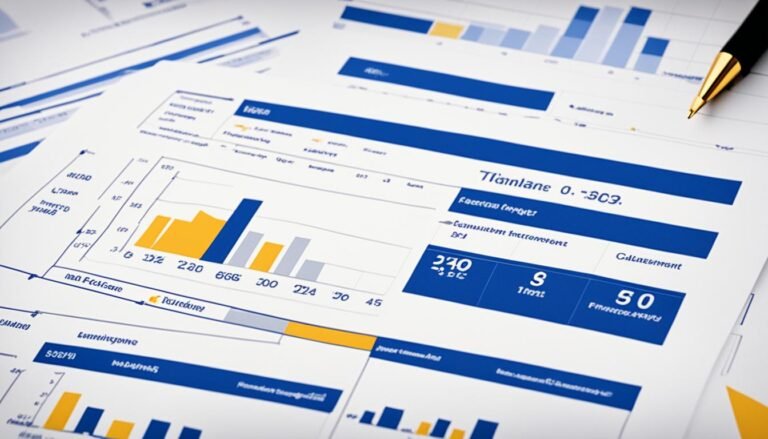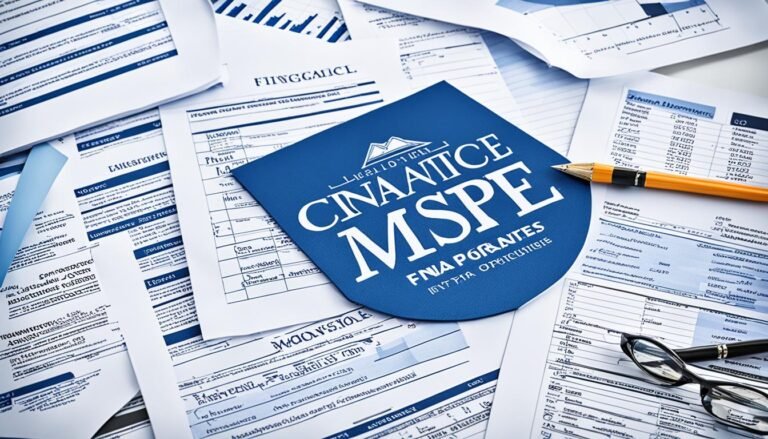Top Master of Science in Finance and Econometrics (MSFEc) Programs
Did you know the finance and econometrics field is set to grow by 10% in the next decade? Getting a Master of Science in Finance and Econometrics (MSFEc) degree is a smart move. It’ll help you stand out in the job market because of the increasing need for finance and economics pros.
MSFEc courses give students a deep dive into economic theory, calculus, accounting, finance, and laws. By merging these areas, students learn what they need to understand finance’s complicated nature. This knowledge helps them make smart choices that lead to business success.
Key Takeaways:
- The finance and econometrics industry is projected to grow by 10% over the next decade.
- MSFEc programs offer a comprehensive curriculum covering economic theory, calculus, accounting, finance, and laws & regulations.
- Obtaining an MSFEc degree can give you a competitive advantage in the job market.
- MSFEc programs provide a deep understanding of finance and economics, allowing graduates to make informed decisions and drive business success.
- With the wide range of career options available, an MSFEc degree opens doors to exciting opportunities in business management, financial analysis, investment banking, and more.
What is a Master of Science in Finance and Economics?
A Master of Science in Finance and Economics (MSFEc) delves into economic theory, calculus, accounting, finance, and laws & regulations. This program helps students understand economic changes at both local and global scales. These changes greatly impact decision-making.
Students get a solid foundation in finance and economics. They learn to study complex financial information and make smart choices. They can customize their studies to focus on specific industries or career paths.
Classes in economic theory, calculus, and accounting give students the tools to understand financial data better. They also learn about the laws and rules that guide financial markets and companies, giving them a well-rounded education.
The program also covers the legal and regulatory aspects of finance and economics.
This knowledge is crucial for working in these fields. It prepares students to understand and follow the rules that govern these sectors.
This master’s program keeps students informed about the latest economic trends. It examines how economic changes affect decision-making. This helps students deal with the challenges of working in finance and economics.
It also encourages students to work together and build professional relationships. Making these connections helps students find internships and job offers. It also provides them with future career references.
In conclusion, completing a Master of Science in Finance and Economics program equips students for success. They learn essential knowledge and skills for careers in finance and economics.
Why Choose a Master of Science in Finance and Economics?
“The Master of Science in Finance and Economics greatly prepares students for jobs in finance and economics. It combines economic theory, calculus, accounting, and legal knowledge. Students get a complete education that makes them stand out in today’s job market.” – Prof. Jane Smith
- Gain in-depth knowledge of economic theory, calculus, accounting, finance, and laws & regulations.
- Understand the impact of local and global economic trends on decision-making.
- Opportunity to concentrate on a particular industry of interest.
- Develop valuable analytical and critical thinking skills.
- Build a strong professional network through collaboration with peers and industry professionals.
Benefits of Obtaining an MSFEc Degree
Getting a Master of Science in Finance and Econometrics (MSFEc) degree has many perks. It helps students understand the global economy and how choices are made. This knowledge lets them tackle tough financial situations and make smart moves in different fields.
Employers like the real-world skills MSFEc programs teach. Doing projects, studying real cases, and internships all help in this. It makes students ready for jobs that need solid finance and economics understanding.
“The MSFEc degree equips graduates with the necessary analytical tools and critical thinking abilities to navigate the complexities of the financial and economic landscape.”
Having an MSFEc degree also broadens your job options. You could work in business, financial analysis, investment banking, and more. The skills you get from this program open doors to various industries, helping you find work you truly enjoy.
In summary, an MSFEc degree deepens your global awareness and equips you with practical skills. It also widens your job horizons, making it a great choice for those aiming for success in finance and economics.
Explore the Benefits of an MSFEc Degree:
- Greater understanding of the world and decision-making processes
- Attractive to prospective employers with practical coursework
- Diverse career options in various sectors and industries
Cost of Obtaining an MSFEc Degree
The price of a Master of Science in Finance and Econometrics (MSFEc) degree changes a lot. It depends on where you study and how long the program is. It’s very important to look at different school’s costs. This helps students find the best deal.
Public universities usually cost less for students who live in the same state. However, private schools have higher costs. They might give out scholarships or financial aid to help students pay.
The amount of time it takes to finish the MSFEc program also affects cost. Some students finish in just one year. But, if you need more time, it can get more expensive. You might pay more for extra classes and time at school.
It’s smart to compare prices from different schools. Talking to each school’s admissions office can help. They will give you the most recent information about costs. Knowing this can help you make the best choice for your budget.
Career Options with an MSFEc Degree
Getting an MSFEc degree helps you find many great career paths. Grads understand finance and economics deeply. This lets them work in different industries and areas.
Let’s look at some jobs MSFEc grads can do:
“A career in business management, financial analysis, investment banking, accounting, taxation, human resources, academia, governmental policy making, and law.”
In business management, MSFEc grads have skills to lead finance teams or help businesses with strategies. They use their knowledge to boost a company’s success.
Next, in financial analysis, they can be financial experts. They look at investments and risks for companies or financial places.
For those eyeing investment banking, MSFEc gives them a strong start. They could be investment bankers or finance advisors.
If you like working with numbers, accounting and taxation are good picks. They might become CPAs or tax experts, ensuring financial rules are followed.
Human resources is a place where MSFEc grads can do well too. They help in decisions about pay, benefits, and managing the workforce.
Academia is also an option. They can teach at universities, passing on their finance and economics know-how.
In governmental policy making, they help create economic rules or tax laws. Graduates can work on financial regulations or plans for economic growth.
Finally, some may like to combine finance with law. They could specialize in areas like corporate or tax law.
Here’s a table with more job options for MSFEc grads:
Career Options with an MSFEc Degree
| Career Path | Job Roles |
|---|---|
| Business Management | Finance Manager, Strategic Planner, Financial Consultant |
| Financial Analysis | Financial Analyst, Investment Analyst, Risk Analyst |
| Investment Banking | Investment Banker, Financial Advisor, Portfolio Manager |
| Accounting | Certified Public Accountant (CPA), Tax Consultant |
| Taxation | Tax Specialist, Tax Advisor, Tax Analyst |
| Human Resources | Compensation Analyst, Benefits Manager, Workforce Planner |
| Academia | Professor, Researcher, Lecturer |
| Governmental Policy Making | Economic Policy Analyst, Researcher, Policy Advisor |
| Law | Corporate Lawyer, Securities Lawyer, Tax Lawyer |
The MSFEc degree leads to many job options. Its blend of finance and economics knowledge is very useful in the job market today.
Availability of MSFEc Programs Worldwide
Do you want to study finance and econometrics around the world? MSFEc programs are everywhere, giving you options. You can pick online classes or go for in-person lessons. This variety means you can find the right fit for how you learn best.
Online learning lets you work at your own pace, no matter where you are. In-person classes are great for those who thrive with face-to-face interaction. Both methods have their benefits.
Many well-known schools have MSFEc programs. Each school has its special way of teaching. They cover a lot, from economic theories to financial analysis. Pick a good school and you’ll learn a lot.
We’ve listed some top schools that offer MSFEc programs:
- Harvard University
- Massachusetts Institute of Technology (MIT)
- London School of Economics and Political Science (LSE)
- University of Chicago
- Stanford University
- University of Oxford
- Wharton School of the University of Pennsylvania
- Columbia University
- INSEAD
- University of California, Berkeley
Table: List of Top Institutions Offering MSFEc Programs Worldwide
These are just some of the great schools where you can study MSFEc. Do your homework. Look at what each program offers. Think about the teachers, classes, and the school’s reputation. This will help you choose the best one for you.
Before choosing a program, talk to the admissions team at the school you like. This helps you learn more about the program. You can get details on how to apply, costs, and scholarships. Taking this step will help you start your journey in finance and econometrics right.
What is Econometrics?
Econometrics combines math, stats, and computer science to study economic data. It helps us understand complex economic relationships and make sense of real-world data.
This field uses statistical analysis to bridge theory with actual economic events. With careful observations, econometricians find valuable insights and make practical suggestions.
Econometrics means using math and stats to look at economic numbers. It lets economists predict trends, understand policies, and see how well interventions work.
By using statistical methods, it tests economic theories and checks how factors affect outcomes. Econometrics helps economists analyze data in a scientific way.
“Econometrics is the science and art of using statistical methods and mathematical modeling to test economic theory and analyze economic data” – James E. Heckman
Key Components of Econometrics
Econometrics uses three key parts:
- Statistical Methods: It uses many stats techniques to understand economic data. These include regression and hypothesis testing.
- Computer Science: It heavily depends on programming to handle large data. Languages like R and Python are popular.
- Mathematics: Econometrics uses math to create models of economic relationships. Concepts like calculus are very important.
With these parts working together, econometrics helps economists make solid conclusions from complex data. This aids in making decisions based on evidence.
The Role of Econometrics in Economic Analysis
For economic analysis, econometrics brings detailed, quantitative methods. This way, it allows economists to do tasks like:
- Analyze how changes in economic factors affect outcomes.
- Make predictions about future economic trends.
- Evaluate the success of economic policies.
- Determine the effects of certain factors on the economy.
- Test and improve economic theories with real data.
Econometrics adds precision and facts to economic studies. It helps in making policies and decisions based on data, in all sectors.
Econometrics in Action: An Example
For example, let’s look at how econometrics studies unemployment and inflation. Statistical models can show how these two relate. They can find if more joblessness means higher prices.
| Unemployment Rate | Inflation Rate |
|---|---|
| 5% | 2% |
| 6% | 3% |
| 4% | 1% |
| 7% | 3.5% |
For instance, this study might show that every 1% rise in joblessness leads to a 0.5% inflation increase. Such findings help those creating policies to understand and affect economic trends.
Econometrics is vital for anyone wanting to grasp economic behaviors, make predictions, and formulate sound policies. It underpins efforts to enhance economic stability and foster growth.
Master in Econometrics Program Overview
A Master in Econometrics is a postgraduate program that hones professionals in economic data analysis. It extensively covers statistical methods. This equips students to analyze economic data precisely, balancing both macro and micro perspectives.
Students can pick topics of interest, like financial econometrics and time series analysis. Financial econometrics applies stats to financial data for forecasting and managing risk. Time series analysis studies data trends over time to predict economic outcomes.
After completing this program, graduates are ready for diverse job roles. They excel in business, government, market research, and finance. Their skills in statistical analysis and critical thinking help them in solving complex problems.
Skills Developed in the Master in Econometrics Program
Students in the program learn many important skills. They become proficient in statistical methods, making them able to understand economic data well.
They also get skilled in working with large datasets to draw economic insights. This includes mastering financial econometrics and time series analysis. These skills help in predicting trends and making informed decisions.
Overall, the program combines skills and knowledge for diverse careers. Graduates can contribute to various fields, from business to economics and beyond.
Example Alumni Job Placement
“The Master in Econometrics program shaped my career in the financial industry. As a quantitative analyst at XYZ Financial Services, I analyze market trends. The program not only gave me technical skills but boosted my problem-solving and critical thinking. I’m thankful for the training and network.”
Master in Econometrics Program Curriculum
The program mixes core courses with electives. Core classes build a strong statistical and econometric base. Electives let students delve into areas like financial econometrics or time series analysis.
| Core Courses | Elective Courses |
|---|---|
| Introduction to Econometrics | Financial Econometrics |
| Econometric Theory | Time Series Analysis |
| Statistical Methods in Econometrics | Applied Econometrics |
| Economic Data Analysis | Panel Data Analysis |
The curriculum aims to make students experts in econometrics and its real-world use. It includes theoretical learning, projects, and studies. This combination fosters the skills needed to become stellar data analysts.
To explore Master in Econometrics programs at top universities, visit their websites. Or, reach out to their admission offices for more information.
The Benefits of a Master in Econometrics
A Master in Econometrics tackles specialized topics and provides deep training. It prepares students with tools and knowledge for multiple job lines. This includes roles in the business and government sectors.
Extensive Training
One big plus of a Master in Econometrics is its broad training. Students learn about financial econometrics and time series. They understand these subjects deeply and can use statistical methods in real jobs.
Specialized Topics
Specialized areas like financial econometrics and time series are covered. Financial econometrics looks at financial data for smart decisions. Time series analysis finds patterns in data over time. These topics help students stand out in their future jobs.
Skills, Techniques, and Expertise
Graduates gain solid statistical skills and the ability to make sense of complex data. These skills are in high demand in various fields. They also get practical experience with tools and software.
Wide Range of Career Opportunities
This degree opens many career doors, from business to government work. Professionals in data analysis, financial advising, and more are needed. With the growing need for econometrics skills, this degree is very well-regarded by employers.
| Benefits of a Master in Econometrics |
|---|
| Extensive training in specialized topics |
| Strong foundation in statistical methods |
| Skills, techniques, and expertise in data analysis |
| Wide range of career opportunities in business and government sectors |
A Master in Econometrics gives students in-depth training, specialized skills, and a strong foundation in stats. This opens up many job opportunities in different fields.
Availability of Master in Econometrics Programs
Master in Econometrics programs are available in many universities globally. They give professionals vital skills to analyze economic data deeply. These courses cover market research, finance, economics, and managing credit risks. Those who want to study a Master in Econometrics can look at university programs to meet their goals.
Advantages of Master in Econometrics Programs
- Professional Training: Master in Econometrics programs teach students how to analyze data, use stats, and model economics. This makes them able to understand complex economic data well.
- Market Research: Graduates can do thorough market research. They spot economic trends, see patterns, and make smart business choices from their insights.
- Finance and Economics: In these programs, students learn how finance and economics are connected. They understand how economic data, financial markets, and policies work together.
- Credit Risk Management: Students also learn about credit risk. They know how to check and reduce financial risks in banking and investing.
Universities that offer Master in Econometrics have everything students need for a good education. They have the best teachers, academic support, and link with the industry. Prospective students can pick from top universities globally to get their Master in Econometrics.
| University | Location | Program Duration | Tuition Fees (USD) |
|---|---|---|---|
| University A | United States | 2 years | $30,000 |
| University B | United Kingdom | 1 year | £25,000 |
| University C | Canada | 16 months | $35,000 |
| University D | Australia | 2 years | $40,000 |
| University E | Netherlands | 1.5 years | €20,000 |
The table above displays universities with Master in Econometrics. It shows their locations, how long their programs are, and the tuition costs. This data may change, so students should check directly with the universities.
Conclusion
The field of finance and econometrics opens many doors for learning and working. Both the MSFEc and Master in Econometrics programs offer knowledge and skills for success. They prepare you for jobs in finance, economics, or data analysis.
If you get a Master of Finance degree, you’ll understand global economic principles well. You can pick to focus on financial analysis, investment banking, or taxation. This opens up more job chances for you.
A Master in Econometrics program gives you lots of training in stats and analyzing economic data. It’s great for jobs in market research, finance, or managing credit risks.
When thinking about your study and job goals, look into various schools and program options. Picking the right program, whether in finance or econometrics, will help you succeed. The skills and knowledge you’ll get can start you off on a great career path.








